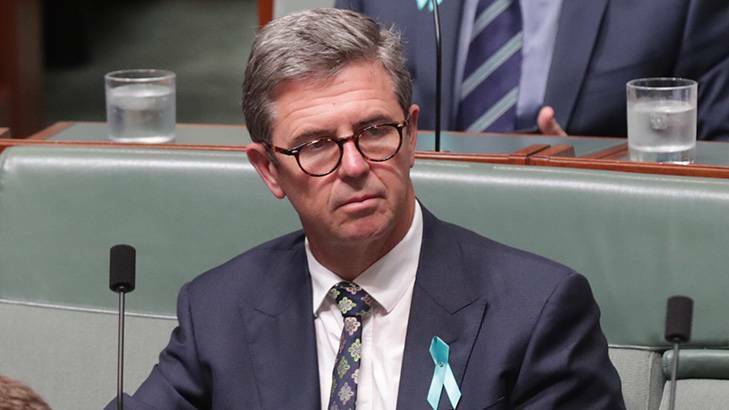
FEDERAL member for Lyne Dr David Gillespie has waded into the heated debate around the decriminalisation of abortion in NSW describing the proposed legislation as "disturbing" and "perplexing".
Subscribe now for unlimited access.
$0/
(min cost $0)
or signup to continue reading
And he warned Nationals state colleagues to carefully consider the ramifications of the legislation.
The NSW Upper House is debating the bill this week.
Lower house MPs voted 59 to 31 in favour of the bill on August 9.
All Nationals MPs voted in favour of the bill with the exception of Myall Lakes MP Stephen Bromhead and Upper Hunter MP Michael Johnsen.
The Reproductive Health Care Reform Bill will allow abortion for any reason up to 22 weeks gestation, and from 22 weeks gestation up to birth if two doctors recommend the abortion based on "physical, social and psychological circumstances".
A doctor who has a conscientious objection to abortion is required to refer the patient to a doctor who doesn't.
A child doesn't miraculously become a human being once it pops out at delivery.
- Dr Gillespie
Abortion currently sits in the Crimes Act in NSW but may be performed by a doctor if they believe the pregnancy is a risk to a woman's physical or mental health and a common law precedent set in 1971 means social and economic factors may also be taken into consideration.
Dr Gillespie believes the legislation is unnecessary because abortion was "decriminalised in 1971 and it is not a crime if you have a lawful abortion in NSW".
"No person has been charged under the Crimes Act bar two cases," he said.
"One was a lady who at 28 weeks pregnancy tried to self-terminate her own pregnancy, and another was unregistered medical practitioner."
He said he was particularly concerned by abortions after 22 weeks based on "embryology, anatomy and physiology".
Dr Gillespie previously worked as the director of physician training at Port Macquarie Base Hospital.
"You are dealing with abortion of a human being that has got a separate circulation and nervous system, all those things make up a human being," Dr Gillespie said
"A child in the womb is another human being and deserves protection.
"A child doesn't miraculously become a human being once it pops out at delivery."
He urged upper house MPs to take into consideration the views of the community on the issue.
"If they want to take the community with them they should at least have more than five days to debate it and an inquiry because 13, 000 people applied to make a submission in 24 hours that gives you an idea of the community interest in it," he said.
A hastily formed inquiry into the bill after community backlash received 13,000 submissions in a day, causing state parliament's web portal to temporarily crash.
Not all in the medical community share Dr Gillespie's views.
The proposed Bill reflects existing arrangements and good clinical practice
- NSW Australian Medical Association
The Australian Medical Association NSW branch described the bill as "well-considered" and leading to only a "moderate change to the law in NSW".
"It reflects on the experiences of all other states in Australia who have undertaken abortion law reform, including, most recently, Queensland," a spokesperson for the AMA said.
"The proposed bill reflects existing arrangements and good clinical practice."
The legislation has exposed deep divisions within the NSW Coalition which less than six months ago was triumphantly returned for a third term.
Police Minister David Elliott accused his Liberal colleague Andrew Constance, the government's leader in the lower house, of "maladministration...in presenting what has already proven to be a poorly written legislation" in a widely circulated Facebook post.
Upper house Liberal MP Natasha Maclaren-Jones has also publicly criticised the process around the bill saying it was "was sprung on the people and the parliament", given unnecessary priority and rushed to a lower house vote.
The bill was introduced by independent MP for Sydney Alex Greenwich but developed by a cross-party working group with the oversight of Health Minister Brad Hazzard.
Port Macquarie MP Leslie Williams was a co-sponsor of the bill and has been one of the leading proponents of the bill.
"I received a letter from the Zonta Club of Port Macquarie urging me to support the Reproductive Health Care Reform Bill 2019, which reflected the international organisation's view," Mrs Williams said.
"Zonta agrees with the United Nations Commission on the Status of Women, which states in part that 'the human rights of women include their right to have control over and decide freely and responsibly on all matters related to sexuality, including sexual and reproductive health, free of coercion, discrimination and violence, as a contribution to the achievement of gender equality and the empowerment of women and the realisation of their human rights'.
"I understand this is a sensitive, emotive and complex issue and that people will have differing views."

